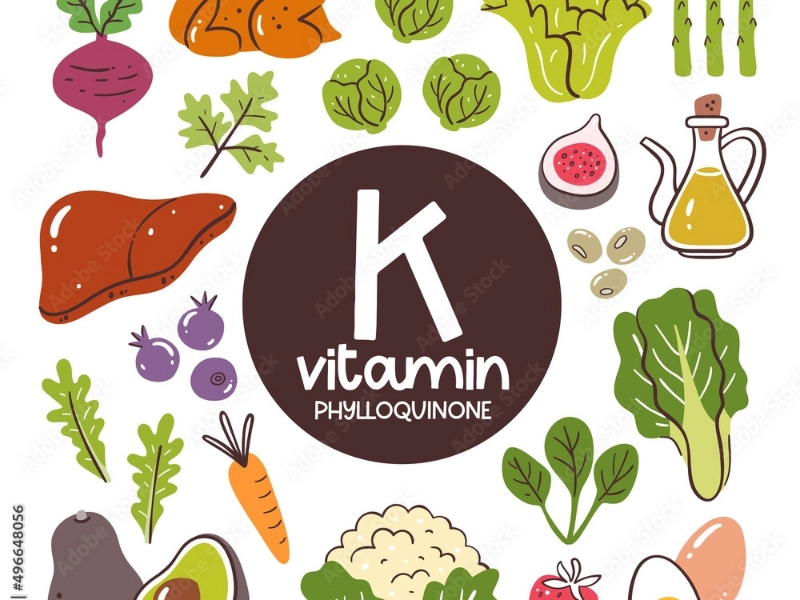How Vitamin K Influences Immune System Function
Gamma-carboxyglutamic acid (Gla) is formed when glutamic acid residues in protein structures are converted by vitamin K-dependent carboxylase (VKDP), which is catalyzed by vitamin K. Gla has a variety of physiological roles, including controlling vascular health, elastin breakdown, blood coagulation, and immunomodulation. According to studies supported by Kappa Bioscience, vitamin K2 is soon to rank among the most crucial supplemental nutrients, especially when it comes to cardiovascular and bone health. However, it might also play a significant part in enhancing COVID-19 results.
Phylloquinone

Quinaquine
 One fat-soluble vitamin that is crucial for blood clotting is vitamin K. It works with other substances to turn on vitamin K-dependent extrahepatic proteins (VKDPs), which make proteins C, S, and Z, which are important for stopping blood clots. Also, VKDPs like Glycoprotein VII, Osteocalcin, and Matrix Gla-protein (MGP) help change the extracellular matrix. This stops vascular calcification and breaks down inflammatory elastin fragments, which is a process that is slowed down in people with long-term lung diseases.
Furthermore, vitamin K can affect how well the immune system functions by interacting with other enzymes that control cytokines and chemokines, as well as hepatic procoagulants. It has been demonstrated that vitamin K2 in particular functions as an immunosuppressive agent, preventing the release of pro-inflammatory cytokines and limiting T cell proliferation.
Furthermore, vitamin A interacts with retinoic acid receptors to influence the immunological response. Vitamin A is a dietary micronutrient. The metabolic breakdown of b-carotene activates RARs to create retinaldehyde molecules, which control the activation of many immune-related genes.
One fat-soluble vitamin that is crucial for blood clotting is vitamin K. It works with other substances to turn on vitamin K-dependent extrahepatic proteins (VKDPs), which make proteins C, S, and Z, which are important for stopping blood clots. Also, VKDPs like Glycoprotein VII, Osteocalcin, and Matrix Gla-protein (MGP) help change the extracellular matrix. This stops vascular calcification and breaks down inflammatory elastin fragments, which is a process that is slowed down in people with long-term lung diseases.
Furthermore, vitamin K can affect how well the immune system functions by interacting with other enzymes that control cytokines and chemokines, as well as hepatic procoagulants. It has been demonstrated that vitamin K2 in particular functions as an immunosuppressive agent, preventing the release of pro-inflammatory cytokines and limiting T cell proliferation.
Furthermore, vitamin A interacts with retinoic acid receptors to influence the immunological response. Vitamin A is a dietary micronutrient. The metabolic breakdown of b-carotene activates RARs to create retinaldehyde molecules, which control the activation of many immune-related genes.
K2 vitamin
 Although preventing blood clots is vitamin K's primary role, new research indicates that it also has a variety of beneficial immune-modulatory effects. For instance, research has indicated a correlation between worse COVID-19 results and lower vitamin K levels [10]. Also, vitamin K2 has been shown to stop the production of proinflammatory cytokines like TNF, IL-1, and IL-6 in a mouse model of colitis caused by dextran sulfate sodium.
Finally, it has been demonstrated that vitamin K2 inhibits IKK kinase activity, preventing IkB phosphorylation, thus blocking the expression of cell cycle protein D1 and reducing cancer cell growth. Additionally, it lowers the chance of hepatocellular carcinoma metastasizing to the liver and limits cancer growth.
These results show that vitamin D and vitamin K have a significant interaction and that each has a unique function in immunological health. The interaction of these vitamins is a potent instrument for immunological control and could be essential to treating the residual effects of COVID-19 infection in a more comprehensive manner. A Norwegian business called Kappa Bioscience is presently conducting clinical trials to evaluate the effectiveness of its vitamin K2, known as menaquinone-7 (MK-7) K2Vital, in treating and preventing COVID-19 infections. We anticipate seeing the first findings this winter. Visit https://kappabioscience.com/nvt/covid-19-prevention-clinical-trials/ for more details on this study.
Although preventing blood clots is vitamin K's primary role, new research indicates that it also has a variety of beneficial immune-modulatory effects. For instance, research has indicated a correlation between worse COVID-19 results and lower vitamin K levels [10]. Also, vitamin K2 has been shown to stop the production of proinflammatory cytokines like TNF, IL-1, and IL-6 in a mouse model of colitis caused by dextran sulfate sodium.
Finally, it has been demonstrated that vitamin K2 inhibits IKK kinase activity, preventing IkB phosphorylation, thus blocking the expression of cell cycle protein D1 and reducing cancer cell growth. Additionally, it lowers the chance of hepatocellular carcinoma metastasizing to the liver and limits cancer growth.
These results show that vitamin D and vitamin K have a significant interaction and that each has a unique function in immunological health. The interaction of these vitamins is a potent instrument for immunological control and could be essential to treating the residual effects of COVID-19 infection in a more comprehensive manner. A Norwegian business called Kappa Bioscience is presently conducting clinical trials to evaluate the effectiveness of its vitamin K2, known as menaquinone-7 (MK-7) K2Vital, in treating and preventing COVID-19 infections. We anticipate seeing the first findings this winter. Visit https://kappabioscience.com/nvt/covid-19-prevention-clinical-trials/ for more details on this study.








